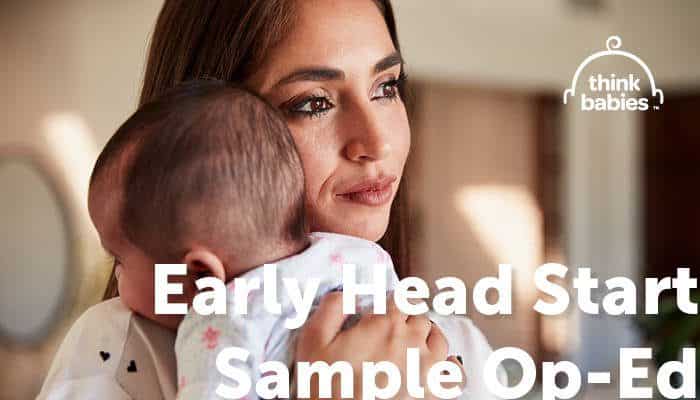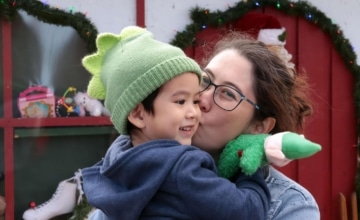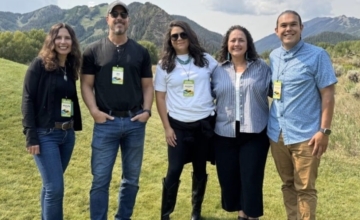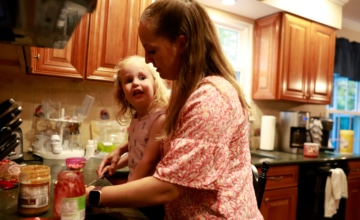Use the following sample op-ed to raise awareness of Early Head Start through the media. Be sure to personalize the text and make it relevant to your community in order to help policymakers Think Babies!
For more information on how to write an op-ed, click here. If you’d like assistance submitting an op-ed to your local paper, email us at [email protected].
Sample Op-Ed: Early Head Start Provides Essential Support
Each and every baby born in [STATE] represents infinite potential. In the first three years, a child’s brain grows faster than at any later point in life, forming more than a million connections each second that lay the foundation for all later development and learning. But especially after COVID, the story of babies in our state is unfortunately one of potential limited. Babies are more likely to be poor than any other age group, living in families without enough income to meet basic needs. Food insecurity, unstable housing, or environmental chaos and violence pervade their lives, creating chronic and unrelenting stress that undermines development.
The stress of poverty can last a lifetime. Children who start out in poverty are more likely to fall behind in their language development, lag behind in later reading proficiency, and experience learning disabilities and developmental delays. As adults, they are more likely to have reduced earnings capacity and hours worked, and increased likelihood of obesity and other poor health outcomes as adults.
Fortunately, we know what babies need to ameliorate the impacts of poverty and set them on a path to success: Early Head Start.
[INSERT A SIMILAR LOCAL EXAMPLE THAT ILLUSTRATES THE CHALLENGES FAMILIES FACE IN PREGNANCY OR WITH INFANTS AND TODDLERS AND HOW EARLY HEAD START HELPED]
When Maya Ramirez was born ten weeks early, her parents, Maria and Sean, fell in love at the first sight of her, but they were worried about her future. Maya was their first baby, and they were really unsure about how to care for one with significant medical needs. Plus, they were worried about money. Sean lost his job in the COVID pandemic a few months after they found out they were expecting. After two weeks in the hospital, Maya was discharged with a heart monitor, and a social worker recommended Early Head Start. When Maria called, the recruiter helped her access groceries and help with the electric bill, and got Sean information on a certification program that he hoped could help him find a job. Three weeks later, Joan, an Early Head Start home visitor, started coming to Maya’s home every week. While Joan referred Maya for a developmental screening, Maya was doing really well, and not eligible for early intervention services. But the family worried that she could fall behind quickly. So Joan and the family focused on ways to build on Maya’s learning. Today, at 11 months, her heart monitor packed away weeks ago, Maya is healthy, strong, and funny, Sean is taking online classes, and with Early Head Start’s help, Maria found flexible work with a delivery service. Maria and Sean credit those visits with Joan for keeping Maya’s development on track, despite a rocky start: “She helped us make sure that Maya was doing everything she needed to, and that we could help Maya learn new skills!” Maria says. “And we feel hopeful about the future.”
Early Head Start is a federally funded program that provides comprehensive services to under resourced infants, toddlers and their families, as well as pregnant women across the United States. Communities tailor the program to offer high-quality infant-toddler child care and/or home visiting services to meet the needs of local children and families. In addition, in order to address the complex risks of poverty, Early Head Start programs provide a full range of services to enrolled children and families, including health and mental health, nutrition, and family support services. And Early Head Start pays off. Children in Early Head Start show positive impacts, including enhanced cognitive and language skills and decreased aggressive behaviors. The research also showed that families were more emotionally supportive, provided more support for children’s language development and learning, and were less likely to use harsh discipline strategies such as spanking. Enrollment in Early Head Start also promoted parents’ participation in education and training as well as their employment.
But access to this critical program is nowhere close to what it needs to be. Before COVID, nationwide, only 7% of eligible children across the country had access to Early Head Start. Now, the need for Early Head Start services is even greater. Now is the time for Congress to increase access to Early Head Start, a program that helps where poverty hurts. Doing so will ensure that all babies and toddlers have the early experiences they need to thrive.
[AUTHOR’S NAME, TITLE AND ORGANIZATION (IF APPLICABLE)]





